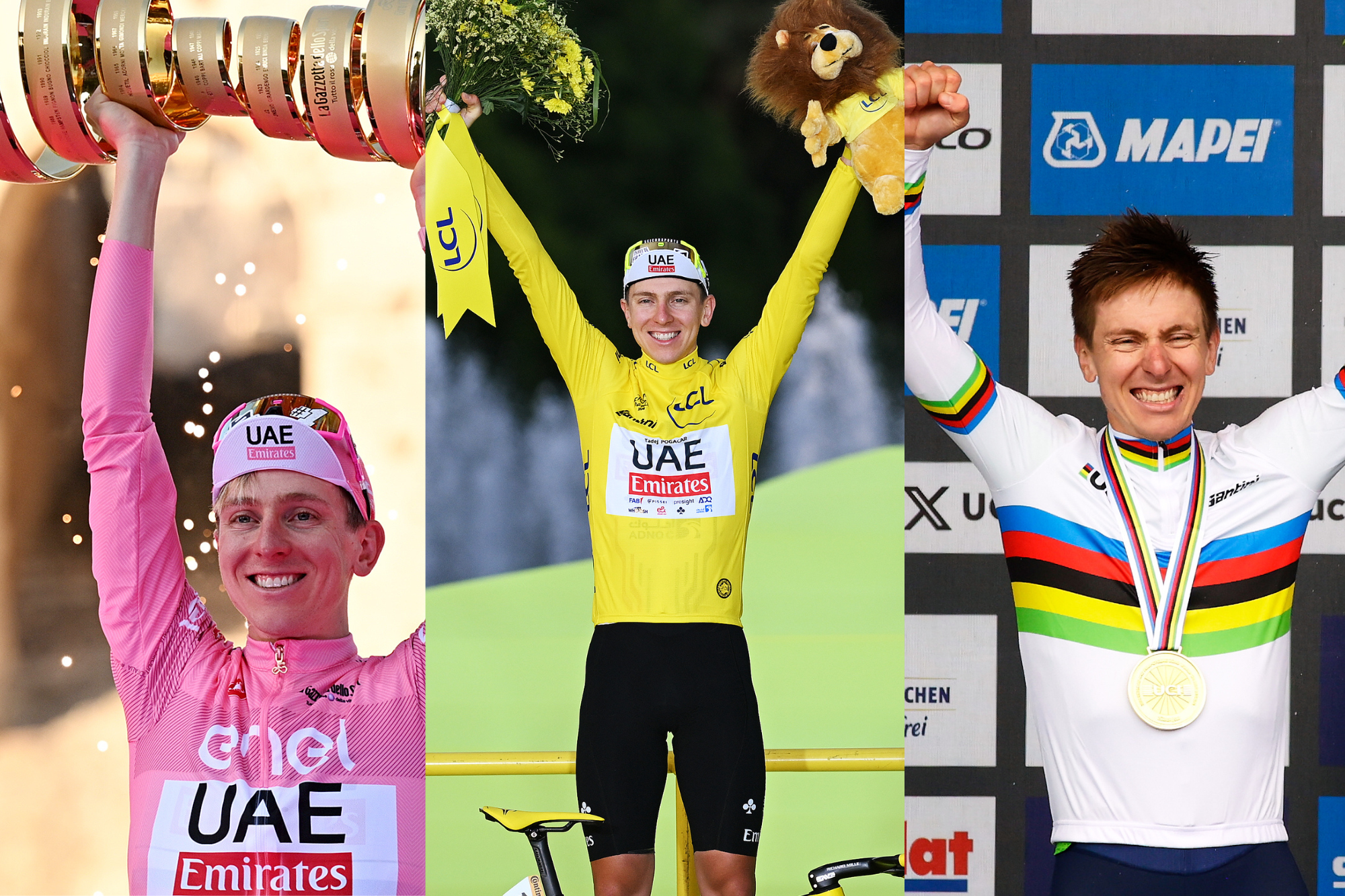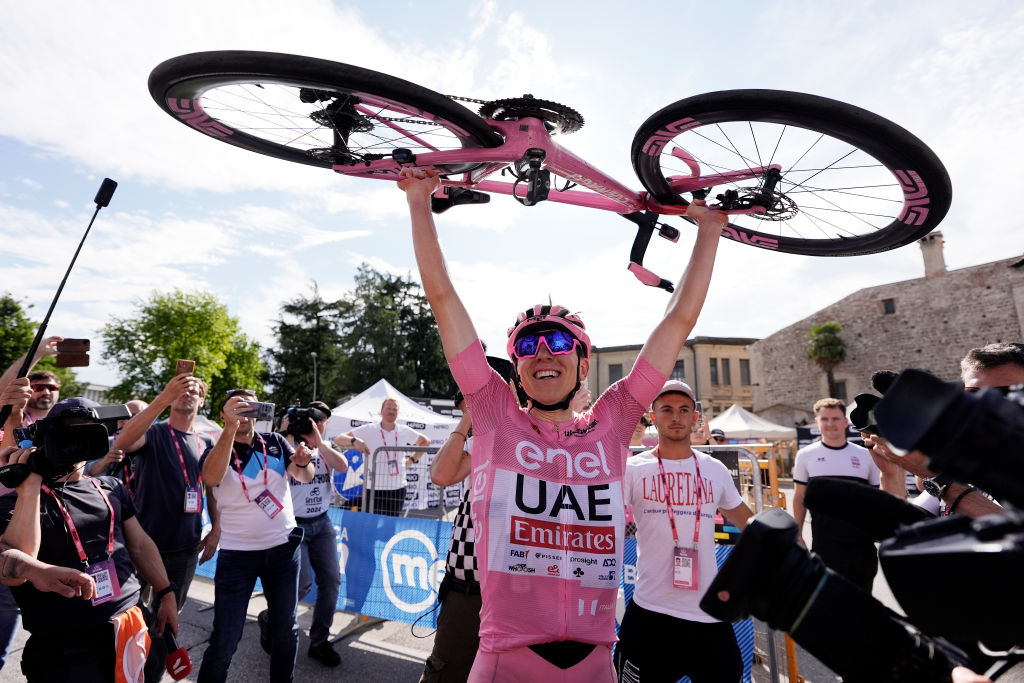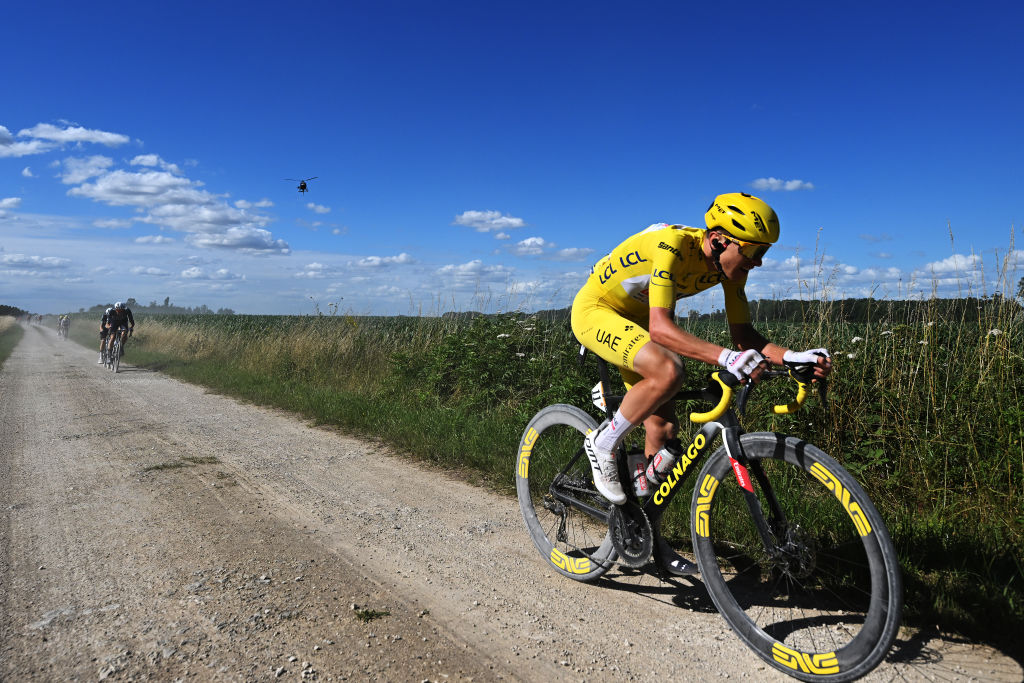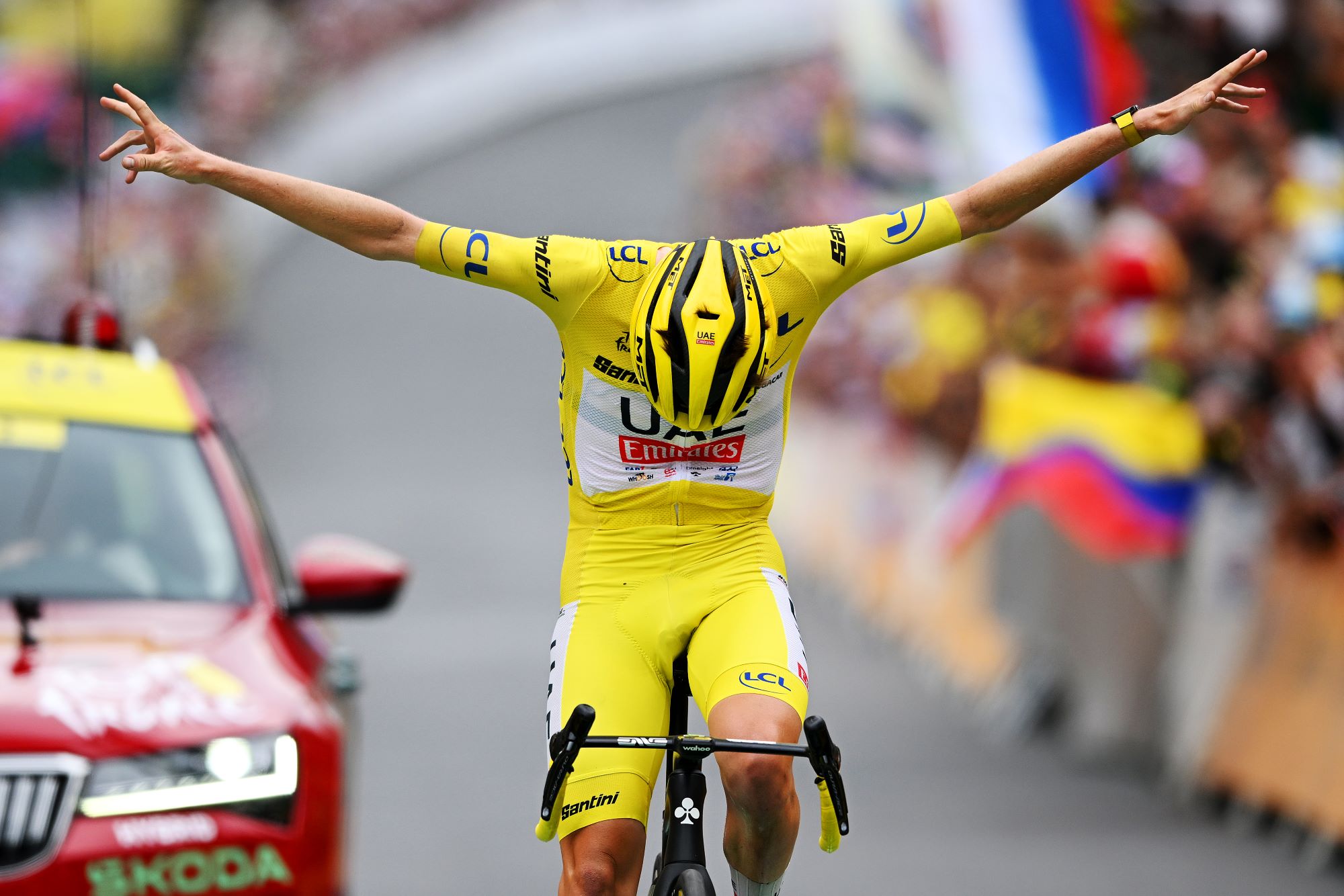
It all started in the back of a taxi in December for Tadej Pogačar with a cheeky ‘andiamo’ – let’s go. The genesis of a journey of 7,088km, 101,400 metres of elevation gain, 13 summit finishes, four time trials, 39 days as leader, 12 (twelve) victorious stages, wind, rain, snow, roasting heat, bottles gifted to fans, glasses and jerseys given to fellow riders, and a successful attempt at doing what many greats have tried and failed, and only Eddy Merckx and Stephen Roche have done, but no-one since 1987: the Triple Crown of the Giro d'Italia, Tour de France and World Championships.
Cycling’s most complex challenge – his verdict when it was announced: “It’s one of the hardest things to achieve” – rendered all but impossible in the modern age, with him branded foolish for even trying it. But why do just one Grand Tour, when, “in my head, I can do all three if I want,” the 25-year-old stated. Why, too, do just the earliest one, when there’s so much more cycling still to be done. “If you do just the Giro, it’s basically the end of the season,” he pointed out. Why also do only one three-week race, when you cannot only do two, but can win two. “I think after the Giro I’ll have solid time to recover,” he prophetically claimed. And why stop at the Tour when his biggest ambition was not the Giro or the Tour but at the end of the season? "The Worlds!" he laughed when asked what his season's big goal was.
The year started with exemplary and exhibitionary performances: he won Strade Bianche by almost three minutes with an 81km attack that he had forewarned; he won four stages out of seven and the GC at the Volta a Catalunya, the biggest winning margin (3:41) in 41 years; and he won Liège-Bastogne-Liège and his sixth career Monument by 1:39, a gap not seen since 1980.
He claimed that “it doesn’t matter if it’s by one second or five minutes, it’s just important to win,” but this was a ruse, a falsehood, a deception: winning convincingly, battering his opponents, resetting records, indirectly opening up new warehouses to print rewritten history books, is how he pedals, how his legs flex, how he aggressively gets out the saddle for one of his trademark attacks. One, two, a ticking time bomb to quote his friendly foe Remco Evenepoel, and boom. Dopamine sourced, pinging off endorphins.
A proclamation to be the GOAT was delivered with assuredness and absolute conviction: “I’ve now arrived to this point where I really strive to be the best ever… If everything goes as planned I think it’s possible.” He won’t surpass Merckx’s 525 wins, but his team revealed that they’d mapped out a future where he can win every race once – all the Monuments, all the Grand Tours, all the Big Seven one-week stage races, all of everything.
The Giro arrived, and the peloton bowed, unable, often appearing unwilling, to react. Skiers jumped and backflipped over him, and GC ‘rivals’ if ever he had them self-labelled themselves as the “dumbest guy in the race” for even attempting to follow. One, two, three, four – this is getting silly now, lads – five, six wins. And it could have been nine. You just know, however, that he was vexed that he was four seconds shy of winning by 10 minutes.
It was a prolonged three-week training ride with a few intervals thrown in for good measure, everyone suggested, and his team manager Matxin Fernández later admitted it was: “Maybe he rode the Giro d’Italia without exerting himself.” Yeah, no s***, Sherlock. This was a historic mission that would show no mercy to others. Would someone please think of the confused Netflix generation who were trying to get their heads around why bike riders don't try to win every stage, only to see a blonde-haired Slovenian redraw convention and do exactly that.

Yet as ludicrously good as May was – a third of the mission complete – as beautiful as the maglia rosa and the never-ending golden trophy are, pink is not yellow, Rome is not Paris Nice, and the Giro d'Italia, despite its pizza (but not “a pizza with kiwi, hotdogs, cinnamon and chocolate sauce,” as he proposed in December), its pasta, its gelato, its Dolomites, its Amalfi, and its Roman cities, is not the Tour de France with its Alps, its Pyrenees, its Mediterranean, its endless vineyards, its ridiculously long and comical publicity caravan, its suffocating busyness, and its unmatchable title as the best bike race in the world. Il Giro è il Giro, sì, but Le Tour est Le Tour, oui.
By day two of the much-hyped – over-hyped, for this was only ever going to go one way, especially after that crash at April’s Itzulia Basque Country – showdown, he was already attacking, anxious to strike already, impatient to be back in yellow after a hiatus of 718 days. By day four he was crossing over the Galibier 93 seconds faster than anyone else ever had before despite a headwind, and by stage seven’s time trial he had stretched his lead over all his rivals except one to more than a minute. The gravel came, wheels slipped, dust kicked up, drama ensued, but somehow it was a stalemate. At least a catchphrase was born: “Sometimes you need balls to race,” Evenepoel said of their shared rival and his nemesis, Jonas Vingegaard.

The Massif Central then took up the hosting gig, a land of dormant volcanoes, natural amphitheatres, the setting for a Vingegaard comeback that stymied his advances, even embarrassed him, and left his team bitter, wounded, the momentum swinging. “They’ve been playing the victim a bit since the start, but we don’t really buy into this,” snarled Pavel Sivakov, one of his five mountain domestiques.
He himself said his great rival was “in the best shape of his career.” Vingegaard laughed, and he was right to: Pla d’Adet and Plateau de Beille were not just tamed but conquered how no-one has ever ridden a push bike up the Pyrenean beasts before, churning out enough watts in 40 minutes – 460 average; 6.96 w/kg – to cook a jacket potato in a microwave four times over.
His lead tripled to 3:09, the peloton began accepting its fate, and he, increasingly comfortable in his position as the chosen one, the heir to the best ever Merckx, was revelling in its absurdity. “I think we witnessed one of the best performances on a climb ever,” he said. Vingegaard’s team bemoaned that “we can have the best plan, but if Tadej turns out to be the strongest and unbeatable, then the best plan doesn't work.”
Questions were raised about his supremacy, a customary trait that comes with having the yellow jersey, but the mood never strayed into toxicity. Some, most to be honest, sided with the view that he is just a generational talent – “at some point, someone gets ultimate genetics,” one colleague summarised – but others couldn’t place the reason behind his dominance: “Something happened in the last two years and the gap has increased further.”
The only stick to beat him with was the controversial but legal practise of carbon monoxide rebreathing that his UAE team confirmed they use to monitor haemoglobin levels in the blood. He got himself twisted in knots when speaking about it, and then preached that “I think you should avoid grey areas by far.”

What was black and white, and definitely not grey, was that the Giro-Tour double and Triple Crown assault was becoming a breeze without contest. Not even on the dizzyingly-high Cime de la Bonette, where marmots squeaked and eagles sang, could Vingegaard, once the Chief Disruptor, even attempt to profit from his supposed advantage in the higher mountains, and when they turned onto Isola 2000, the vengeful but chipper boy wonder from Slovenia with tufts of hair forever poking through his helmet sealed his adversary's crushing defeat.
24 hours on, he made it two in two days, refusing to give the Dane a consolatory second stage win. Then, on the last stage, a rollercoaster time trial from Monaco to Nice on the roads he trains his magic spells on, he made it three in three, and six for the Tour, registering win number 18 out of 52 race days this season – one victory every three days. Before he was playful, now he was ruthless, completely obsessed by winning, engrossed in the pursuit of victory. Coppi, Anquetil, Merckx, Hinault, Roche, Indurain, Pantani. And now Pogacar. The Giro-Tour double had its eight member.
"Extreme fatigue" meant a holiday ensued, but he returned in Canada to win the GP Montréal, the prelude to the final act of the mission: the World Championships. Everyone expected him to go with 50km remaining, but he doesn't do foreseen, the predictable and the normal: he does the unforeseen, the unpredictable and the un-normal. 100km out? Yeah, go on then, why not. He won comfortably, as he always does. Has there ever been a more deserving world champion?
In December, at the start of an adventure he was warned was fraught with risk and uncertainty, he said that “it can be super good, really good, or not so good. I won’t say bad, but mediocre. We can define success after the races.” The final answer, after a ninth month odyssey, is that Tadej Pogačar is unequalled, unparalleled, and utterly unbeatable. "It's out of this world," he correctly summarised. The Triple Crown club has swelled to three.
This article was updated on September 29 to reflect Pogačar's World Championship victory.







